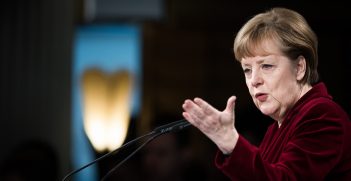It's about time: What to Expect From a New German Government
Germany will go the polls on 26 September 2021, and after 16 years in the Chancellor’s Office, Angela Merkel will finally retire. With less than five months to go, the outcome of the election is absolutely open.
In Germany, an era will end this fall. Angela Merkel, in office since 2005 and Germany’s eighth post-war head of government, will retire. While the fight against the COVID-19 pandemic continues to dominate the news, the elections in September will alter Germany’s political landscape as well as the country’s foreign policy. Considering Chancellor Merkel’s significant errors of judgement in recent years, Germany may emerge from her reign with a fresh look on the many challenges the country is facing. A revision of Germany’s foreign policy is indispensable. Since the last election, Germany’s relations with virtually all partner countries have deteriorated, with one notable exception: China.
A key role for the Greens
The Greens are certainly going to play an important role in the next government. While the party has a tendency to do better in polls than in elections, this time the Greens may score. First the first time in the party’s 40-year history, the Greens have presented a candidate for the chancellorship. Annalena Baerbock represents the fresh look of the Greens: pragmatic, undogmatic, and eager to govern. While she has not held any public office, the Greens nevertheless chose Baerbock over her significantly more experienced co-chairman of the party simply because the credibility of the Greens would have suffered a severe blow with a male frontrunner. In addition, both the Conservatives and the Social Democrats have selected male candidates for the chancellorship.
Armin Laschet from North Rhine-Westphalia is Baerbock’s main challenger. Although the Conservatives are currently weak, by September the country will probably have recovered from the COVID-19 crisis. The governing party will benefit from the end of the pandemic and will be able to claim some credit for Germany’s performance in the crisis. Of course, that performance was relatively poor. In a manner that surprised many but certainly not all Germans, the individual freedoms of citizens were curtailed to prevent the spread of COVID-19. Germany was much slower than the best-of-class in vaccinating its citizens. But there appears to be surprisingly little resentment in German society about the mismanagement. By and large, Germans like to follow the rules, even if some of them have been Kafkaesque.
Laschet is not popular within his own party and is considered a weak leader. But since the other two contenders are not impressive either, Laschet’s limited charisma may still be sufficient to win him the election. Laschet may not be polarising, but his willingness to search for harmonious solutions may be supported by German voters. His competitor, Olaf Scholz, Germany’s current minister of finance, is the weakest of the three candidates and has no realistic chance to become the next Chancellor. The Social Democrats, once a considerable force in German politics, will struggle to win more voters than the Free Democrats or the Alternative for Germany. In May 2021, there are two leading powers – the Greens and the Conservatives – and three parties that can expect between 11 and 18 percent of the votes – the Social Democrats, the Free Democrats, and the Alternative for Germany. The sixth party is the Left, which is particularly popular in the eastern states.
A consensus on most issues
Of course, the current concentration on personalities reflects the lack of substance in the German political debate. All parties, with the exception of the national-conservative Alternative for Germany, are in favor of European integration, a comprehensive social security net, and above all, a sustainable economic policy. There is no disagreement on these issues. In the absence of divergence in substance, there is emphasis on variance in personal style, age, and gender.
It appears implausible to expect a continuation of the current coalition of Conservatives and Social Democrats in the next government. The last four years were characterised by a tired government which lacked inspiration and initiative. Germany was administered rather than governed. In foreign affairs, Germany was both selfish and timid. Germany has been selfish because it ignored the criticism of its European and American partners in important fields. In particular, the sustained violation of a European accord on current account surpluses upset Southern Europeans. The Trump administration regularly complained about Germany’s failure to honor its NATO commitments of spending two percent of GDP on defense. Ironically, German policy makers consider these pledges as of minor importance. Chancellor Merkel, responsible for both, has demonstrated a remarkable arrogance of power and was enjoying widespread support in pushing these unilateral breaches. Some observers, for instance the historian Michael Stürmer, have questioned the ability of German to honor commitments in alliances.
Whether that unwillingness to cooperate and honour treaty obligations will change with a new government can be disputed. Annalena Baerbock has already argued that military spending is not a priority for her. Rather, climate-conscious Greens may well embrace economic policies that discriminate against countries that contribute to climate change. The recently re-elected Green premier of Baden-Wuerttemberg, Winfried Kretschmann, has argued that the main challenge for policy makers is to secure the freedom for future generations. That freedom is supposedly threatened by climate change.
A new radicalism in climate policy
The fight against climate change of the next German government may well lead to radical and unprecedented policies and may (further) reduce the country’s ability to act constructively in international relations. There is a significant risk that the next German government will try to characterise the fight against climate change as a fight for the freedom of future generations, a fight for survival. Needless to say, such an epochal task requires the stymieing of any dissenting views in the debate, both at home and abroad. In international affairs, that kind of radicalism is a recipe for confrontation and isolation.
There are two likely scenarios regarding the next government. The most likely is a coalition of the Greens and the Conservatives which may need a third partner to form a coalition. The Free Democrats would be the most likely option. Less likely and significantly more radical would be a coalition of the left parties: Greens, Social Democrats, and the Left. The latter would constitute a significant departure from previous governments, since the radical left has not participated in any government at the federal level.
However, there is one area where Germany will most probably abandon its previous position: the policy on the People’s Republic of China. Chancellor Merkel has been increasingly isolated within her own party on China. While she had been able to push the conclusion of the agreement on investment between China and the European Union at the end of 2020, that treaty is unlikely to be supported by the European Parliament and will thus not be implemented. Merkel continues to ask for a continuation of the close ties between Germany and the People’s Republic of China despite many, if not most, of her peers having revised their stance. Merkel does not even consider China to be a systemic rival of the West and prevents her staff from using the term. In August this year, one of her last trips as Chancellor will take her to China, her 13th visit to the Communist country.
Neither Baerbock nor Laschet will continue that irritatingly cozy relationship. Both have publicly argued against close cooperation with China and Russia. And both will probably be reminded of the fact that despite China’s economic rise, intra-European economic relations are more important than those with China. In 2019, total trade between Poland and the Czech Republic (€226.6 billion) was significantly higher than total trade between Germany and the PRC (€173.3 billion). The next German government will most probably join other democratic countries in their effort to contain China’s aggressive foreign policy.
Prof Dr Heribert Dieter is a Senior Fellow at the German Institute for International and Security Affairs, Berlin, and Associate Professor at the University of Potsdam. Email: heribert.dieter@swp-berlin.org
This article is published under a Creative Commons License and may be republished with attribution.





